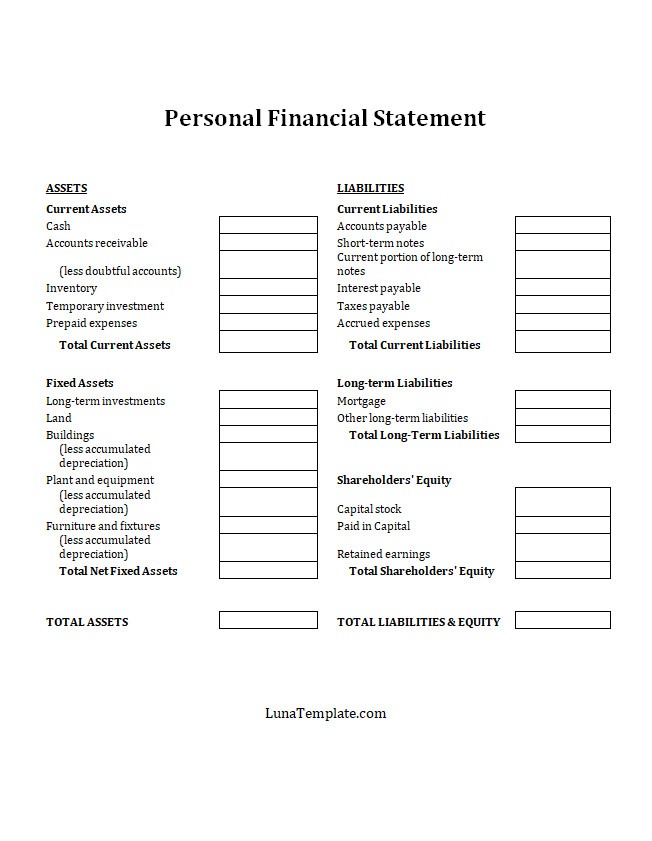Managing your finances can often feel overwhelming, especially when it comes to understanding your current financial status and setting financial goals. However, a personal financial statement can help simplify this process by providing a detailed overview of your assets and liabilities at a specific point in time.
This article will explore what a personal financial statement is, why it is useful, how net worth is calculated, and what to do if you have a negative net worth.
What is a Personal Financial Statement?
A personal financial statement is a spreadsheet that outlines the assets and liabilities of an individual, couple, or business. It provides a snapshot of your financial situation at a specific moment, allowing you to assess your net worth and evaluate your overall financial health. This statement typically includes information about your savings, investments, real estate, debts, and other financial obligations.
By organizing all of this information in one place, a personal financial statement helps you gain a better understanding of your financial standing and make informed decisions about your money.

Why is a Personal Financial Statement Useful?
A personal financial statement is a valuable tool for several reasons:
- Assessing your current financial status: By detailing your assets and liabilities, a personal financial statement provides an accurate picture of your financial health. This information can help you identify areas where you may need to make adjustments or improvements.
- Tracking net worth: Net worth is calculated by subtracting your liabilities from your assets. A personal financial statement allows you to track changes in your net worth over time, giving you a clear indication of your financial progress.
- Setting financial goals: With a personal financial statement, you can set specific financial goals based on your current situation. Whether it’s saving for a down payment on a house or paying off debt, having a clear understanding of your financial standing will help you create realistic and achievable goals.
- Preparing for financial applications: Lenders often require personal financial statements when you apply for credit or loans, including mortgages. By having an up-to-date personal financial statement on hand, you can streamline the application process and demonstrate your financial stability to lenders.
Overall, a personal financial statement empowers you to take control of your finances and make informed decisions about your money.
What are Assets and Liabilities?
To understand a personal financial statement, it’s important to distinguish between assets and liabilities:
- Assets: Assets are anything of value that you own. They can include cash, savings accounts, investments, real estate, vehicles, and personal belongings such as jewelry or artwork.
- Liabilities: Liabilities are the debts and financial obligations you owe. This can include credit card debt, student loans, mortgages, car loans, and any other outstanding loans or bills.
When calculating your net worth, you subtract your liabilities from your assets. This provides a clear picture of your financial standing and helps you understand how much wealth you have accumulated.
How is Net Worth Calculated?
Net worth is calculated by subtracting your liabilities from your assets. The formula for calculating net worth is:
Net Worth = Assets – Liabilities
To calculate your net worth, you’ll need to gather all the necessary information about your assets and liabilities and input them into a personal financial statement. This statement will automatically calculate your net worth based on the values you provide.
Tracking your net worth over time is essential for assessing your financial progress and determining whether you’re moving closer to your financial goals.
What If You Have a Negative Net Worth?
If your liabilities exceed your assets, you will have a negative net worth. While this may seem discouraging, it’s important to remember that a negative net worth can be improved with careful financial planning and budgeting.
If you find yourself with a negative net worth, consider taking the following steps:
- Create a budget: Review your income and expenses to identify areas where you can cut back and save money. Creating a budget will help you prioritize your spending and allocate funds toward paying off debts.
- Reduce unnecessary expenses: Take a close look at your spending habits and identify any unnecessary expenses. Cutting back on non-essential items can free up funds to pay off debts and improve your net worth.
- Focus on debt repayment: Prioritize paying off high-interest debts first, as this will save you money in the long run. Consider strategies such as the debt snowball or debt avalanche method to accelerate your debt repayment.
- Explore additional income streams: If possible, look for ways to increase your income. This could involve taking on a side job, freelancing, or starting a small business. The extra income can be used to pay off debt and improve your net worth.
- Seek professional advice: If you’re struggling to improve your financial situation, consider consulting with a financial advisor or credit counselor. They can provide personalized guidance and support to help you get back on track.
- Stay motivated: Improving your net worth takes time and dedication. Stay focused on your financial goals and celebrate small milestones along the way. Remember that every step forward is a step towards a brighter financial future.
By taking these steps and consistently working towards improving your financial situation, you can turn a negative net worth into a positive one over time.
Conclusion
A personal financial statement is a valuable tool for managing your finances and gaining a clear understanding of your financial standing. By tracking your assets, liabilities, and net worth, you can make informed decisions about your money, set financial goals, and work towards improving your financial health.
Whether you’re applying for a loan or simply want to gain a better understanding of your financial position, a personal financial statement is an essential tool for financial management.
Personal Financial Statement Template – Word